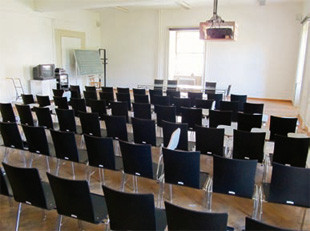Summer Academy
07 Jul - 14 Oct 2012
SUMMER ACADEMY
Art and the Critique of Ideology after 89
7 July - 14 October 2012
One of the KUB Arena’s particular qualities is its repeated use of formats that question and extend the scope of traditional exhibition presentations. In its summer program this year the KUB Arena dedicates itself more clearly than ever to artistic research and knowledge production. In collaboration with the renowned Institute for Art Theory and Cultural Studies of the Academy of Fine Arts Vienna as well as the author und theoretician Max Jorge Hinderer Cruz, the KUB Arena will question present-day »ideological constellations« and subject them to up-to-the-minute discussion. Following a one-week lecture seminar with students and a conference with international guests in Bregenz an extensive collection of essays will appear in the KUB Arena publications series to bring together the results of the gathering.
We are particularly interested in the development of critique inside and outside of the art field and in aesthetic theory in an increasingly globalized world after the end of the Cold War. A tendency toward political critique has been discernible in the world of art since the 1990s and over the past fifteen years has been increasingly articulated in the institutional context. It is a development found not only at conceptually curated biennales and contemporary art museums but increasingly in the world of art galleries and on the art market. One sees here that the »critique of social conditions« is not only tolerated but that it also satisfies a demand. In this spirit the KUB Arena project devotes itself to analyzing the self-conception of society underlying art production and the various interests at the heart of the post-1989 art world.
The epochal turning point of 1989/91 also marks the proclaimed »end of ideology«—after the so-called clash of ideologies came to an end, not only was the notion of a social reality based on complex ideas declared obsolete (»social market economy« and »socialism«), it was also claimed that »reality« is accessible in an unobstructed and unbiased way. Simultaneously, theoretical approaches, such as critical theory, which until this point saw their task in the critique of ideology and had attributed a special role therein to art, lost a great deal of their academic and discursive influence.
The project Art and the Critique of Ideology after 89 reconstructs the critique of ideology in its central texts since 1968 and examines its role both within and outside of the sphere of art after the »historic freeze« of 1989/91.
Precisely in respect of art the question arises as to what extent new formulations of ideology-critical positions were elaborated in the 1990s—e.g. through exhibitions such as the 3rd Havana Biennale 1989, documenta X 1997, Kassel, Global Conceptualism: Points of Origin 1999, New York and elsewhere, and documenta11 2002, Kassel—and how it was possible for these to become transformed, contrary to their intent, into a fetishized »art business as usual« object.
Art and the Critique of Ideology after 89
7 July - 14 October 2012
One of the KUB Arena’s particular qualities is its repeated use of formats that question and extend the scope of traditional exhibition presentations. In its summer program this year the KUB Arena dedicates itself more clearly than ever to artistic research and knowledge production. In collaboration with the renowned Institute for Art Theory and Cultural Studies of the Academy of Fine Arts Vienna as well as the author und theoretician Max Jorge Hinderer Cruz, the KUB Arena will question present-day »ideological constellations« and subject them to up-to-the-minute discussion. Following a one-week lecture seminar with students and a conference with international guests in Bregenz an extensive collection of essays will appear in the KUB Arena publications series to bring together the results of the gathering.
We are particularly interested in the development of critique inside and outside of the art field and in aesthetic theory in an increasingly globalized world after the end of the Cold War. A tendency toward political critique has been discernible in the world of art since the 1990s and over the past fifteen years has been increasingly articulated in the institutional context. It is a development found not only at conceptually curated biennales and contemporary art museums but increasingly in the world of art galleries and on the art market. One sees here that the »critique of social conditions« is not only tolerated but that it also satisfies a demand. In this spirit the KUB Arena project devotes itself to analyzing the self-conception of society underlying art production and the various interests at the heart of the post-1989 art world.
The epochal turning point of 1989/91 also marks the proclaimed »end of ideology«—after the so-called clash of ideologies came to an end, not only was the notion of a social reality based on complex ideas declared obsolete (»social market economy« and »socialism«), it was also claimed that »reality« is accessible in an unobstructed and unbiased way. Simultaneously, theoretical approaches, such as critical theory, which until this point saw their task in the critique of ideology and had attributed a special role therein to art, lost a great deal of their academic and discursive influence.
The project Art and the Critique of Ideology after 89 reconstructs the critique of ideology in its central texts since 1968 and examines its role both within and outside of the sphere of art after the »historic freeze« of 1989/91.
Precisely in respect of art the question arises as to what extent new formulations of ideology-critical positions were elaborated in the 1990s—e.g. through exhibitions such as the 3rd Havana Biennale 1989, documenta X 1997, Kassel, Global Conceptualism: Points of Origin 1999, New York and elsewhere, and documenta11 2002, Kassel—and how it was possible for these to become transformed, contrary to their intent, into a fetishized »art business as usual« object.

